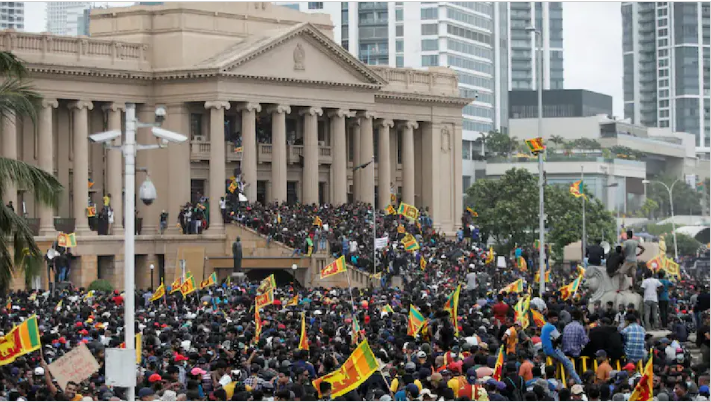The leaders, who attended an emergency meeting called by the speaker on Wednesday evening, demanded that Prime Minister Ranil Wickremesinghe resign from his post and also resign as acting president. The opposition parties demanded that the speaker should take over as the interim speaker.
The political and economic crisis in Sri Lanka is deepening. On the one hand, angry demonstrators took to the streets demanding the resignation of their President and Prime Minister due to the skyrocketing inflation of essential commodities over the past several months. On the other hand, there is a tussle between the political parties regarding the post of President and Prime Minister.
The leaders, who attended an emergency meeting called by the speaker on Wednesday evening, demanded that Prime Minister Ranil Wickremesinghe resign from his post and also resign as acting president. The opposition parties demanded that the speaker should take over as the interim speaker. Protests turned violent last Saturday when protesters stormed the homes and offices of the president and prime minister. Even the private residence of Prime Minister Ranil Wickremesinghe was set ablaze by the protesters. Thousands of people occupied Rashtrapati Bhavan. In the video, several of them were seen swimming in the pool inside the premises, wrestling on the President's bed, and cooking in the kitchen. President Gotabaya Rajapaksa fled the country on Wednesday without resigning from his post. First, he stayed in the Maldives, leaving for Singaporthe e late at night. However, there were also demonstrations against Gotabaya in the Maldives.
1- When President Gotabaya Rajapaksa fled to the Maldives in a military plane on Wednesday morning, a state of emergency was declared in Sri Lanka shortly thereafter. Amid the worst economic situation in the country, angry protesters stormed the Prime Minister's office after the President left the country. A nationwide curfew was imposed till 5 am on Thursday amid the uproar in the country.
2- 73-year-old Gotabaya Rajapaksa went to the Maldives before resigning on Wednesday. He left the country to avoid the possibility of arrest by the new government. Before that, Prime Minister Ranil Wickremesinghe was appointed acting president, triggering a new wave of protests.
3- Sources in Maldivian capital Male told news agency PTI that the President of the Majlis (Parliament) of Maldives and former President Mohamed Nasheed had negotiated for Rajapaksa to escape to the Maldives. The Maldivian government argues that Rajapaksa is still the President of Sri Lanka and has not resigned. Also, he has not given his powers to any successor. So if he wanted to visit the Maldives then it could not be denied.
4- Although the Maldivian government is yet to make an official statement, Maldivian National Party (MNP) leader and former Maldivian Foreign Minister Dunya Maumoon said that it is very disappointing that the Maldivian government did not care about the sentiments of the Sri Lankans. . Hassan Jiau, Director of Communications at the Parliament Secretariat, said that Parliament was not aware of the matter.
5- Sri Lankans living on the island started protesting as soon as the news of Rajapaksa's arrival in the Maldivian capital Male. The video showed protests in Male carrying the Sri Lankan national flag and anti-government slogans, demanding that Gotabaya Rajapaksa be sent back to Sri Lanka.
6- Thousands of protesters in Sri Lanka defied the emergency by waving the Lankan flag and surrounding the Prime Minister's Office. Police fired tear gas at the protesters, who broke through a barricade and stormed the Prime Minister's Office demanding his resignation. Wickremesinghe said he was concerned about the inputs from the intelligence services.
7- Prime Minister Ranil Wickremesinghe, in his first televised statement since taking office as interim president, declared a nationwide emergency and imposed a curfew in the city and surrounding areas. “We must put an end to this fascist threat to democracy. We cannot allow the destruction of state property. The President's Office, the President's Secretariat, and the Prime Minister's official residence must be returned to proper custody,” he said.
8- Wickremesinghe said that a committee of Chiefs of Armed Forces has been given the responsibility to restore normalcy and there will be no political interference in those decisions. However, this further angered anti-government protesters, who demanded both the president and the prime minister get out of the crumbling economy. Sri Lanka's Chief of Defense Staff (CDS) appealed to the protesters to support the administration and maintain peace in the country. Addressing a press conference along with the Chief of the Air Staff and the Navy Chief, the CDS asked the protesters to remain calm and help the armed forces maintain law and order.
9- Sri Lanka's state-run television channel temporarily suspended broadcasts on Wednesday afternoon after protesters stormed its building. Another state television channel shut down less than an hour after Roopvahini suspended all live and recorded broadcasts.
10- The Bar Association of Sri Lanka asked the protesters to remove all occupied premises.
